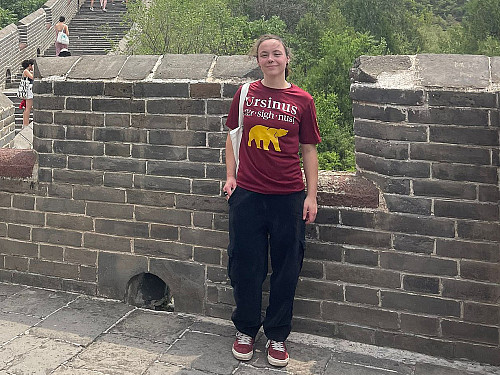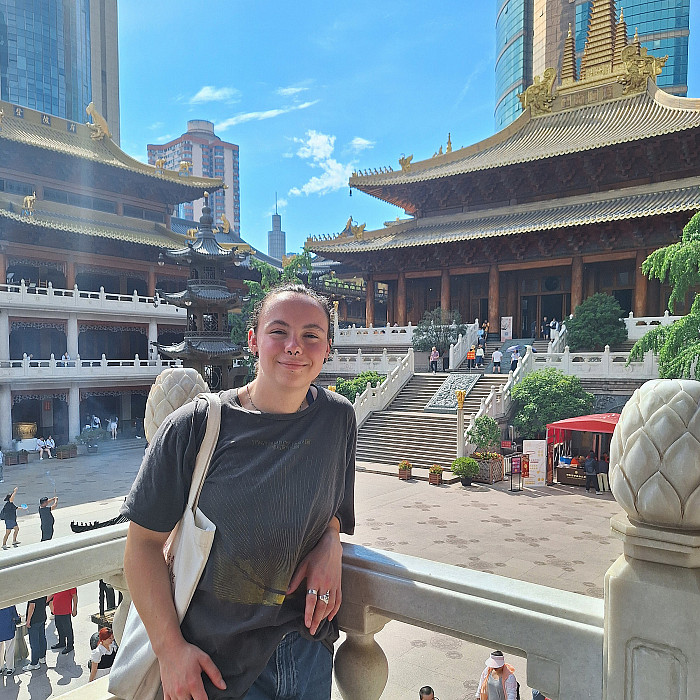Abroad in Asia: Learning Chinese with the Princeton-in-Beijing Program
Juniper Bauroth-Sherman ’26 spent eight weeks during the summer traveling to China as a part of the prestigious Princeton-in-Beijing program
One of the best parts about traveling the world is exploring all the different cultures each place has to offer. That exploration can come in the form of foods, traditions, or languages. One Ursinus College student got to experience it all as a part of a fully immersive study abroad experience this summer.
Juniper Bauroth-Sherman ’26 traveled to China as a part of the prestigious Princeton-in-Beijing (PiB) program, which offers intense courses taught entirely in Chinese. The curriculum is based off Princeton University’s two-semester language program, which is condensed into eight weeks for students who are either indeterminate or advanced learners of the Chinese language.
Bauroth-Sherman and her classmates lived and studied at Beijing Normal University. All PiB students were also required to sign a pledge where they could only speak in Chinese throughout the entire experience.
“It became really interesting to see people who were in the middle stages of learning a language communicate and form relationships only using that language,” Bauroth-Sherman said.
For Bauroth-Sherman, her initial interest in the Chinese language came about as a hobby in high school. The physics major from Reading, Pa., decided to learn Chinese her freshman year, recalling what she remembered from a summer camp she attended as a child. Once she arrived to Ursinus and started taking Chinese classes for her minor, Bauroth-Sherman found it came easy to her, so she approached Visting Assistant Professor of Modern Languages Qian “Stephanie” Sun to do more.
“After I went to her office hours, she began to teach me more out of the Princeton Chinese textbook, which is what that they use for their curriculum,” Bauroth-Sherman said. “After that, she suggested I apply for the program.”
The application process for Bauroth-Sherman included a lot of paperwork and an audio recording of her speaking Mandarin for three to five minutes. As a physics major, Bauroth-Sherman’s desire to study a language abroad was unique, but many students in the program were also STEM majors.
“I think learning a language has a similarity in aptitude to STEM classes,” Bauroth-Sherman said. “For example, they say learning mathematics is like learning a new language, and I think that train of thought is a big reason why a lot of STEM majors were there.”
Once she got to China, she spent a lot of time in the classrooms at Beijing Normal University. She took classes that focused on subject matter such as Chinese idioms, history, food, and several other subjects. The intensity of the program meant Bauroth-Sherman would spend four 50-minute periods in class, then the rest of the day finishing homework and studying.
“It was a very intense time academically,” Bauroth-Sherman said.
On the weekends, Bauroth-Sherman and her friends had the opportunity to explore around the culturally rich country. Most of the landmarks they visited were in Beijing, outside of a weekend trip to Shanghai. One of the first ventures Bauroth-Sherman and her classmates took as a part of PiB was to the Great Wall of China.
“My first impression was that there were so many steps,” Bauroth-Sherman said. “But it was in the mountains, so the views were very majestic.”

For Bauroth-Sherman, one of her biggest takeaways from the trip is the power of language and how much English logic differs from Chinese logic when it comes to learning language.
“If somebody was trying to explain something that they didn’t know in class, other students would often understand it before the professor because our brains operate with the same language structure and logic,” Bauroth-Sherman said.
Bauroth-Sherman also credits Sun for encouraging her to apply to the program.
After Ursinus, Bauroth-Sherman plans to pursue a Ph.D. in physics, with the goal of becoming a researcher. Before going to China in the summer, she participated in Ursinus’s Summer Fellows research program under the mentorship of Professor of Physics Thomas Carroll. She hopes that her future career in research can eventually lead her back to doing research and work in China.
